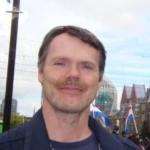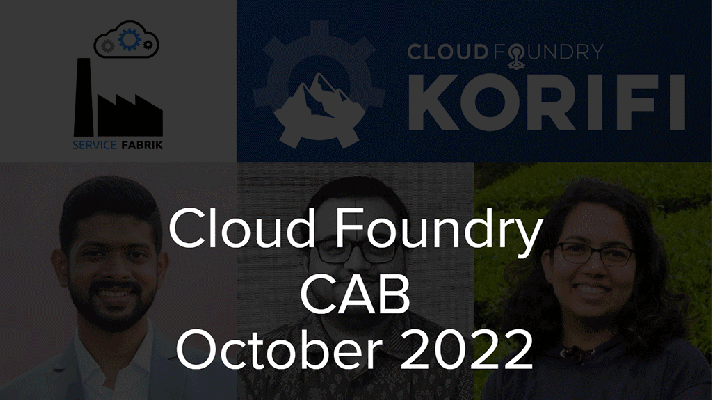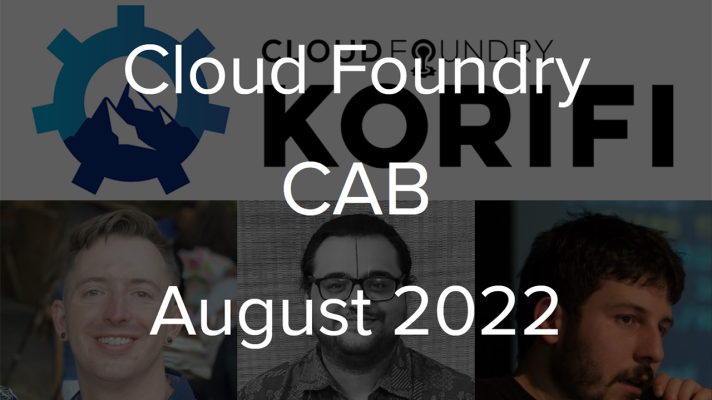Cloud Foundry Advisory Board Meeting, Feb 2020: Using Smoke Tests
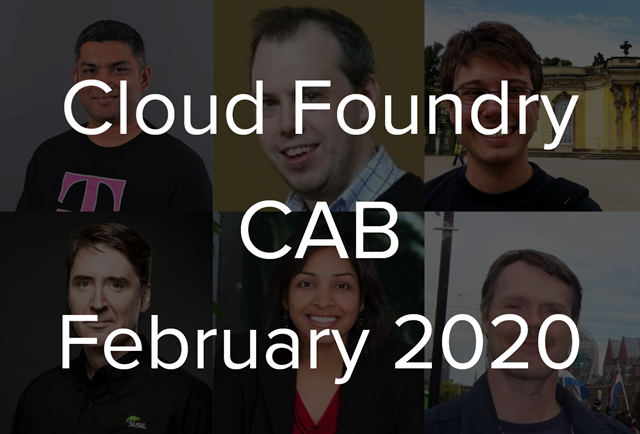
New hosts of the CAB calls
After three years of moderating the Cloud Foundry Community Advisory Board (CAB) meetings, Michael Maximilien (Dr. Max) of IBM has graciously stepped down, allowing new leadership to take charge and continue to push the community forward.
We are thankful for his tireless efforts that have led to the success of the monthly meetings, as well as his consistency in always sparing two minutes, so people call join the call. Dr. Max’s presence in every CAB meeting will be missed.
With Dr. Max’s departure, Troy Topnik and Neil MacDougall of SUSE will be taking over as hosts for the following CAB meetings.
“Please join me in welcoming Troy Topnik as the Cloud Foundry CAB meeting host. Please also join me in thanking Dr. Max for his gracious, thoughtful, and inspiring leadership through these years in establishing and leading CAB meetings to such great success. We will sorely miss him as the host, but we will continue to see him as a participant. A huge thank you to Neil MacDougall, as well, for offering to support Troy as and when needed.” —Swarna Podila, Cloud Foundry Foundation
This month’s CAB meeting was moderated by Neil. The call focused on smoke tests for Cloud Foundry and Kubernetes, as well as updates on the CF4K8s project. It also featured regular updates from various members of the development teams and from the CF Foundation.
Smoke tests at Rijkswaterstaat and T-Mobile
Smoke testing involves a series of tests that determine whether an application is functioning properly. During the call, Onno Brouwer of Rijkswaterstaat and Piyush Diwan of T-Mobile provided the details of their organization’s smoke tests for Cloud Foundry and Kubernetes.
(Not so long ago we’ve written how and why Rijkswaterstaat and T-Mobile adopted Cloud Foundry, as well as the impressive results they achieved. You can also check out how T-Mobile handles millions of transactions daily using Kubernetes.)
While there are open-source smoke tests available, the teams at Rijkswaterstaat and T-Mobile opted to build their own ones in order to get past some of the issues with those provided by the community. For instance, these issues include:
- Upstream changes would cause failures.
- Detailed reports were missing.
- Running the open-source smoke tests required admin privileges, which can be a security risk.
- Unnecessary operations ate up too much time.
- Inadequate post-completion cleanup led to wasted resources.
“When applications don’t work, we need to have a quick way to see if it’s the platform that’s not working or if it’s just one of the hundreds of applications on that platform.” —Onno Brouwer, Rijkswaterstaat
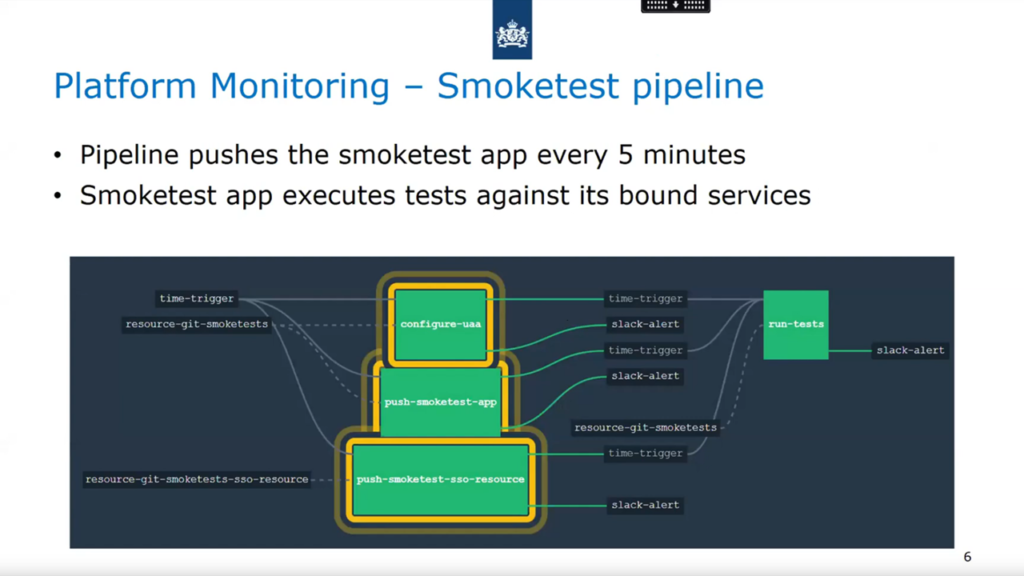 Pipeline smoke testing at Rijkswaterstaat (Image credit)
Pipeline smoke testing at Rijkswaterstaat (Image credit)Onno and Piyush discussed the custom smoke tests built by their teams, but more importantly, they also shared some insights based on their experience.
- Smoke tests help to discover a problem before it impacts customers.
- Monitoring is needed not only for Cloud Foundry and Kubernetes, but also for the underlying IaaS.
- Upgrades may succeed on the platform, but it may cause applications to break.
- Smoke tests that monitor workflows are crucial.
“The Autoscaler and Spring Cloud Services smoke tests are critical ones that have benefited us the most as many of our applications autoscale.” —Piyush Diwan, T-Mobile
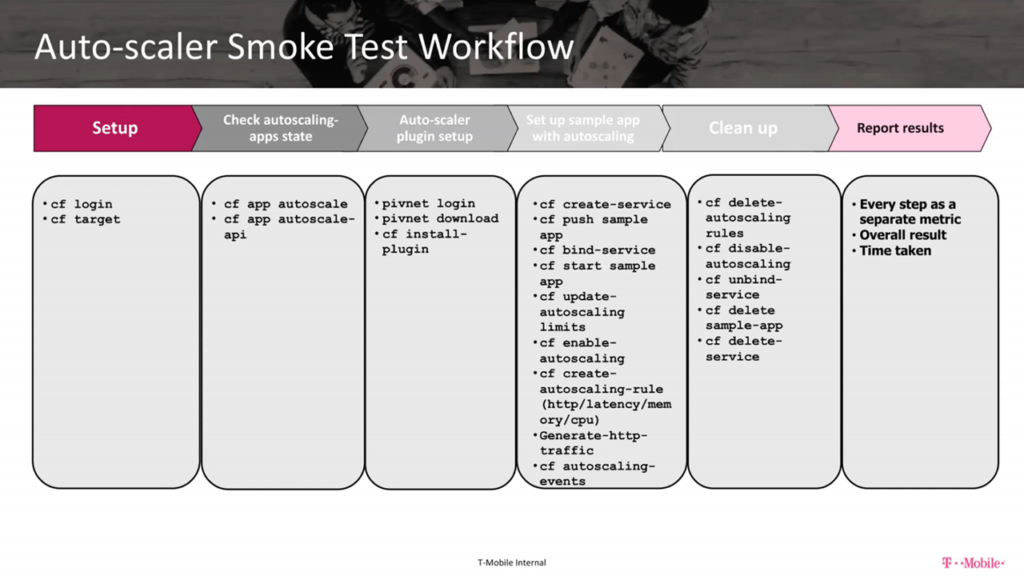 Autoscaler smoke testing at T-Mobile (Image credit)
Autoscaler smoke testing at T-Mobile (Image credit)
Runtime PMC: CF4K8s updates
Eric Malm of Pivotal reported on the following developments:
- The KubeCF project was proposed for incubation.
- The Release Integration team is working on Cloud Foundry for Kubernetes (CF4K8s) development to support the component teams.
- The CAPI team is making progress with the initial integration with kpack for cloud-native buildpacks staging tasks.
- The Loggregator team is incorporating new Fluentd components into CF4K8s.
- The Networking team is integrating Istio sidecars into CF4K8s for the mTLS component to provide more flexibility in certification management.
- The UAA team is continuing to develop artifacts for Kubernetes.
- The Volume Services team is finishing up shared server message block volume services in CF4K8s and KubeCF.
- The Diego team is using diego-release for story tracking and issue intake.
- The Eirini team shipped updates in v1.1. They are now focusing on providing support for Cloud Controller API v3 features, such as tasks and rolling deploys.
CF Foundation updates
With the North American Summit scheduled for June 25, 2020, in Austen, Texas, Swarna Podila provided a couple of reminders. The call for proposals and applications for the diversity scholarship close on March 20, 2020. Swarna also noted that there would not be any keynotes this year, so more time can be allocated to the community discussions.
Meanwhile, the Cloud Foundry Foundation celebrates its 5th anniversary, and we wish many more years of impressive achievements, inspiring projects, and community growth! If you still haven’t checked out this amazing history retrospective, you should definitely take a look at it.
In this bi-weekly report by Chris Clark of the CF Foundation, you can also find additional technical and ecosystem updates for the first half of February.
The next CAB call is scheduled for March 18, 2020. The call will start at 8 a.m. Pacific Time. Anyone interested can join Cloud Foundry’s CAB Slack channel.
Want details? Watch the video!
In this related video, the Cloud Foundry for Kubernetes (CF4K8s) special interest group discusses the progress as of February 2020 and the upcoming roadmap.






